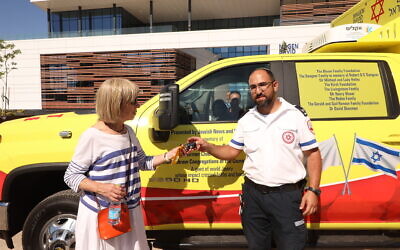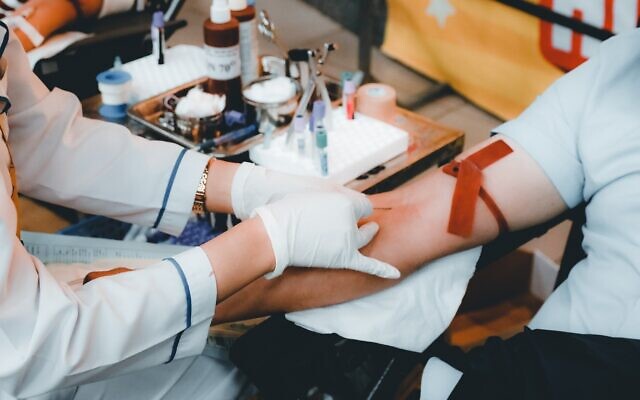A change of heart? Israel may drop ban on Brits giving blood
The ban has long incensed Brits who have made Israel their home, but this week Magen David Adom’s head of blood services said there was “good news” on the horizon.
Brits in Israel could soon be allowed to give blood again if the Israeli government overturns a ban based on the risk of transmitting a fatal brain infection linked to Mad Cow Disease.
British olim who lived in the UK for six months or more between 1980 and 1996 are not allowed to give blood in Israel for fear of transmitting Creutzfeldt-Jakob Disease (CJD), which causes brain damage and kills most of those who catch it.
The ban has long incensed Brits who have made Israel their home, but this week Magen David Adom’s head of blood services said there was “good news” on the horizon.
This is because “the issue is being discussed by the expert committee advising the Ministry of Health on transfusion medicine, which will recommend to the Ministry of Health to rescind the ban,” said Prof. Eilat Shinar.
It marks a trend and follows similar recommendations from the United States’ powerful Food and Drug Administration and from the Australian Blood Services, with those born after 1997 already able to give blood in Israel once they reach 18.
Last month, Jewish News donated a bloodmobile to Israel in memory of the late former Chief Rabbi, Lord Jonathan Sacks
As Shinar explained, the Israeli prohibition covers olim who lived in Britain for more than six months, underwent surgery there, or received a blood transfusion there between 1980 and 1996. Other countries have issued similar bans, based on a World Health Organisation (WHO) ruling.
“The directive is included in the procedures of the Ministry of Health, which are based on international procedures,” said Shinar. “The reason for rejecting donors is the desire to prevent the risk of transmission of the disease nvCJD, otherwise known as Mad Cow Disease for the blood recipients.
“Currently, there is no test that is accepted in blood banks in England and around the world that can be done to donors or administered to detect morbidity from this disease.”
Last month, Jewish News donated a bloodmobile to Israel in memory of the late former Chief Rabbi, Lord Jonathan Sacks, which will travel the country to collect blood from up to 80 donors a day. Few if any of those donors will have been born in Britain.
Anton Delin, an administrator of the Facebook group ‘Brits Living in Israel, which has 9,000 members, said the current ban on Brits giving blood was “outrageous”.
Delin said: “I can donate my organs to someone in Israel but, having lived in the UK during the 80s, which is now 40 years ago, I still can’t donate my blood. It’s very upsetting and unfair.”

Fellow olim Dvora Green said: “I used to donate every four months in England. It’s such a shame. I could have donated for 22 years. It makes me sad and frustrated, especially when I see a shortage in Israel. Olim from Britain have lost the potential to contribute and do a huge mitzvah. It makes me angry.”
Lifelong vegetarian Ruth Pepperman said she “never understood” the ban. “I gave blood in England until we made aliyah in 1981 and I gave blood here for several years. Then, all of a sudden, my blood was no good! It’s irrelevant now due to age but it was a huge source of annoyance and frustration at the time.”
As a volunteer in Magen David Adom (MDA), Francis Shrago takes this personally. “I was a regular blood donor in the UK and every time I see a donor van or go into MDA, I go in there to ask and complain. Whenever I go back to the UK to visit, I try to arrange to donate there.”
Sarah Fairweather Shamir echoed the sentiments. “It drives me crazy when I see reports of a shortage of blood, yet they won’t accept mine because I’m British.”
I used to donate every four months in England. It’s such a shame. I could have donated for 22 years.
Gita Goldschmidt Kramer felt likewise. “It’s very frustrating, especially when a cousin desperately needed blood and none of the family could help. I had a letter from the London Board of Shechita explaining how, due to kashrut, anyone keeping kosher couldn’t be infected with Mad Cow Disease, but it still wasn’t accepted.”
To Noami Rand, the impediment stretches beyond blood. “Not being able to donate bone marrow is even more frustrating,” said Rand. “Two of my sons were matched and donated. Who knows, maybe I too could have saved a life, but because I lived in the UK during that period, they weren’t interested.”
For Valerie Fisher, it comes down to nationality. “They accept blood from French olim, and by all accounts they had more cases than the UK,” she said.
Aurelia Rosenbaum said she thought the Israeli medical authorities should give patients the right to choose whether to accept the blood and waive the risk,” adding: “I’d happily take British blood, knowing the risks.”
Leiah Elbaum shared the feeling of impotence expressed by many, saying: “It’s incredibly frustrating not to be able to do one’s part for the country, especially when there are blood drives during times of crisis, or you see a call for your blood group.”
She added that the “most frustrating” aspect was that, during the years in question, she was a strictly kosher vegetarian. “To the best of my knowledge no kosher herds of cow were affected, and you cannot contract CJD from eating dairy, even from an infected cow.”
Arriving as an 18-year-old in 1991, Benjamin Reisman donated blood twice in Israel in the early 1990s before returning to the UK to study at university after serving in the IDF. He later made aliyah in 1997.
“I remember that first time that I was turned down,” he says. “We’d moved to Neve Tzuf and MDA were running a blood donation afternoon in the hall under the shul. I turned up and started filling in my details.
“Suddenly, someone said I wasn’t allowed to give. I jokingly said, ‘Do I look Ethiopian to you?’, knowing that a short time before, Ethiopians in Israel had been banned from donating blood. Then one of the medics said that it was due to Mad Cow Disease and that Brits could no longer give blood.
“That was nearly 25 years ago. We still can’t give blood now. In my opinion, the only connection to cows is that this policy’s continued enforcement by the Ministry of Health is complete and utter bullsh*t.”

Thank you for helping to make Jewish News the leading source of news and opinion for the UK Jewish community. Today we're asking for your invaluable help to continue putting our community first in everything we do.
For as little as £5 a month you can help sustain the vital work we do in celebrating and standing up for Jewish life in Britain.
Jewish News holds our community together and keeps us connected. Like a synagogue, it’s where people turn to feel part of something bigger. It also proudly shows the rest of Britain the vibrancy and rich culture of modern Jewish life.
You can make a quick and easy one-off or monthly contribution of £5, £10, £20 or any other sum you’re comfortable with.
100% of your donation will help us continue celebrating our community, in all its dynamic diversity...
Engaging
Being a community platform means so much more than producing a newspaper and website. One of our proudest roles is media partnering with our invaluable charities to amplify the outstanding work they do to help us all.
Celebrating
There’s no shortage of oys in the world but Jewish News takes every opportunity to celebrate the joys too, through projects like Night of Heroes, 40 Under 40 and other compelling countdowns that make the community kvell with pride.
Pioneering
In the first collaboration between media outlets from different faiths, Jewish News worked with British Muslim TV and Church Times to produce a list of young activists leading the way on interfaith understanding.
Campaigning
Royal Mail issued a stamp honouring Holocaust hero Sir Nicholas Winton after a Jewish News campaign attracted more than 100,000 backers. Jewish Newsalso produces special editions of the paper highlighting pressing issues including mental health and Holocaust remembrance.
Easy access
In an age when news is readily accessible, Jewish News provides high-quality content free online and offline, removing any financial barriers to connecting people.
Voice of our community to wider society
The Jewish News team regularly appears on TV, radio and on the pages of the national press to comment on stories about the Jewish community. Easy access to the paper on the streets of London also means Jewish News provides an invaluable window into the community for the country at large.
We hope you agree all this is worth preserving.






















